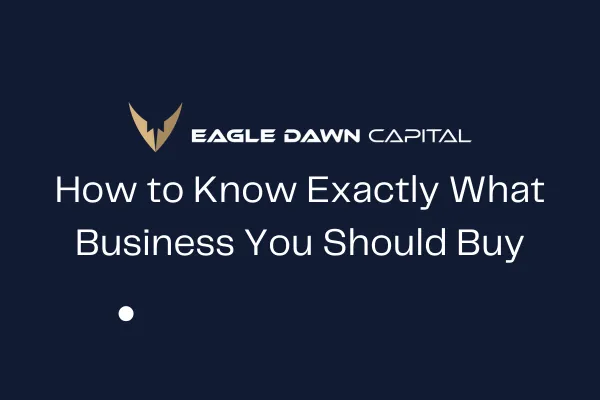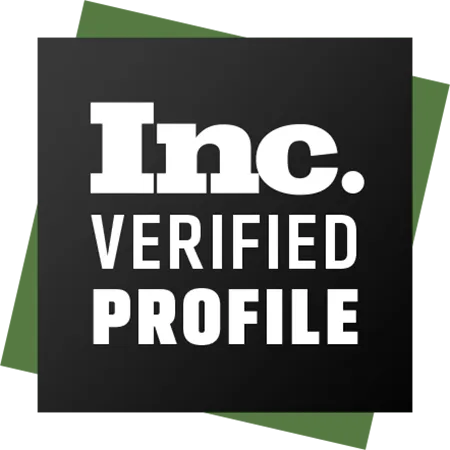
How to Know Exactly What Business You Should Buy
If you're thinking about buying a business, one of the first questions you’ve probably asked yourself is:
“What’s the best type of business to buy?”
It’s a fair question. And when people ask me this, they’re usually looking for one specific type of business that checks every box:
High profit margins
Low risk
Recession-proof
Easy to run
Low employee count
Minimal time commitment
Here’s the truth: That business doesn’t exist.
And if it ever did, every investor would rush in and flood the market overnight.
But there is a business that’s right for you.
In this guide, I’ll help you figure out how to choose the best business to buy based on your experience, time availability, lifestyle goals, and risk tolerance.
Must-Have Traits in Any Business You Buy
Before diving into business types, let’s cover what every business you consider should have, no matter your background or budget.
1. Strong Enough Financials for Financing
If you're using a loan (especially an SBA 7(a) loan), the business needs to generate enough income to easily cover loan payments. The key metric here is:
Debt Service Coverage Ratio (DSCR)
You want at least a 1.25 DSCR — ideally 1.5 or more. This means the business makes 25–50% more than the amount needed to cover debt payments.
2. Low Risk of Technology Disruption
Avoid industries at risk of being wiped out by AI or software. Think DVD rental/ video game stores or basic graphic design shops. Video games are almost all downloaded direct online, and graphic design can be done by AI by a non skilled person in minutes. Look for stable, traditional, non-technology service-based models instead.
3. Recession Resistance
Prioritize businesses that sell needs, not just wants. These are services people rely on regardless of the economy. Examples include plumbing, medical transportation, HVAC, trash removal, pest control, non-medical home care, commercial cleaning, septic pumping, electrical repair, and property management.
4. Low Key-Man Risk
If the seller is the business, meaning they handle sales, ops, and customer relationships, that’s a problem. Look for businesses with systems and teams, not solo hustles.
Decide Based on Your Time Commitment
Your availability matters just as much as your money.
🕒 Have a Full-Time Job or Other Businesses?
Look for low-complexity or “boring” businesses:
FEDEX routes
Car washes
Vending machines
ATM portfolios
Self-storage
Laundromats
These aren’t truly passive, but they can be operated with a part-time manager or limited involvement.
👨💼 Ready to Be Hands-On?
Then you can take on more complex, active businesses like:
Commercial cleaning
Home care agencies
Plumbing or HVAC
Niche manufacturing
B2B staffing or logistics
These businesses often have higher margins and have higher growth potential, but also require more effort to manage, especially early on.
Match Business Complexity to Your Experience Level
New to Business Ownership?
Stick with simple, steady operations:
Recurring revenue
Low employee count
Minimal sales/marketing needs
Great options: residential cleaning, property management, simple route-based businesses.
Experienced Entrepreneur?
You can handle more complexity, risk, and upside:
Growth-focused service businesses
Agencies and tech-enabled services
Medical or compliance-heavy industries
Turnaround opportunities
Pick a Business That Fits Your Lifestyle
Ask yourself:
Do I want regular business hours?
Do I mind getting calls on weekends or late nights?
Do I want to manage a team of 3 or a team of 30?
Some businesses are more predictable. Others will take over your life if you’re not careful.
Compare Example Models:
Self-Storage:
Pros: Low staff, predictable income
Cons: Real estate intensive, high initial cost
Home Care
Pros: Demographic tailwinds, recurring
Cons: Staffing headaches, regulatory risk
Commercial Cleaning
Pros: B2B contracts, scalable
Cons: High churn, after-hours ops
Restoration Services
Pros: High ticket jobs, insurance paid
Cons: 24/7 urgency, operational chaos
Car Wash
Pros: Simple process, cash-heavy
Cons: Maintenance, location-specific risks
Understand Your Personality Type
This one’s often overlooked, but it’s crucial.
Which One Are You?
Doer: Wants to be involved daily, work with hands or run operations.
Builder: Loves improving systems, growing teams, scaling.
Cashflow Buyer: Just wants consistent income, less stress.
Each type fits a different style of business. Matching this well avoids burnout and regret.
Can You Afford to Step Back?
Here’s a quick benchmark for how big a business needs to be before it can support full-time leadership (so you’re not stuck being CEO):
Business Size, Can It Afford a CEO?
<$2M revenue / <$300K profit: Rare, you’ll be the boss
$2M–$5M revenue: Maybe, GM or strong manager
$5M+ revenue: Yes, CEO/C-suite possible
If you’re buying something small, plan to be involved — at least for the first 6–12 months.
Summary: What’s the Best Business to Buy?
There’s no single best business for everyone. But there is a best fit for you based on:
✅ Your time
✅ Your experience
✅ Your income goals
✅ Your personality
✅ Your appetite for risk
Ready to Buy a Business?
At Eagle Dawn Capital, we help buyers like you find, vet, and acquire high-quality small businesses with creative financing, off-market deal sourcing, due diligence, and post-close support.
If you're ready to take the next step, book a free discovery call.




Facebook
Instagram
X
LinkedIn
Youtube